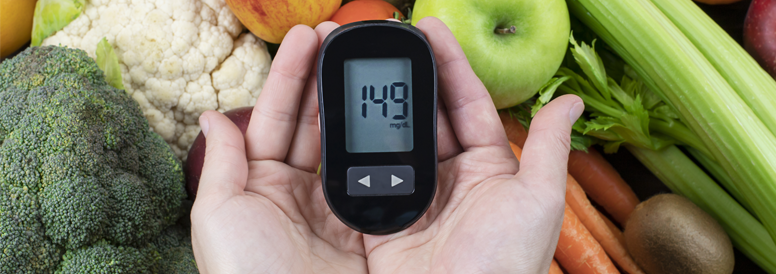The Connection Between Antioxidant Nutrients and Blood Sugar Levels
Free radicals and other reactive oxygen species are always present in the body as a part of normal living and antioxidants are needed to protect cells from this ongoing free radical activity. Antioxidants are both synthesized in the body and gained through the diet and dietary supplements. This combination of endogenous and exogenous antioxidants help provide the required protection from the continuous onslaught of free radicals every human is exposed to on a daily basis. There needs to be a good balance between the amount of free radicals present and the amount of antioxidants available. In many cases, an imbalance can occur – there are too many free radicals being generated and not enough antioxidants in the system to deal with them. This leads to oxidative stress, which can be damaging to tissues and nerve cells.
High blood sugar generates free radicals through several different pathways. In the vascular system, high blood glucose concentrations promote auto-oxidation of glucose to form free radicals. This leads to generation of free radicals usually beyond the scavenging abilities of normal antioxidant defenses which can result in vascular damage and dysfunction. That’s why maintaining blood sugar within the normal range is so important. Individuals who are having issues with blood sugar levels may require higher levels of antioxidants to maintain a good oxidative balance. In these cases, supplementing the diet with antioxidant nutrients makes a lot of sense. That’s why many blood sugar support supplements include antioxidant nutrients in their formulations.
Some antioxidants such as vitamins C and E are not only important for their own primary free radical scavenging ability, they also help recycle and regenerate other antioxidants like glutathione, the “master” antioxidant.
Alpha lipoic acid is an antioxidant that, like glutathione, the body makes endogenously. Lipoic acid is found only in very small amounts in the diet, in foods like leafy greens, broccoli, Brussels sprout and yams and potatoes. However, supplementation of this important antioxidant has been shown to specifically support healthy blood glucose levels by supporting insulin sensitivity as well as supporting healthy nerve function.
Coenzyme Q10 (CoQ10) is another antioxidant that the body produces naturally. Fat-soluble CoQ10 functions as an antioxidant in cell membranes and lipoproteins. This is especially important for the cells lining the vascular system. CoQ10 reduces the oxidation of fats circulating in the arteries which helps protect the vascular lining. Unfortunately, the endogenous synthesis of CoQ10 is affected by various factors and slows down with age, so it is easily and quickly used up. Supplementation with CoQ10 ensures the body has an ample supply. This is important because in addition to being a potent antioxidant, CoQ10 also promotes synthesis of ATP. CoQ10 supports mitochondrial activity and normal cellular function. Research has shown that CoQ10 supports insulin release and cellular insulin sensitivity by supporting mitochondrial energy and cellular function.
Many herbs and spices have high antioxidant activity. Cinnamon has very high antioxidant activity, and extensive research has shown that cinnamon supports healthy glucose levels. Studies have shown that cinnamon supports oxidative balance by reducing oxidative stress. At the same time, supporting the movement of glucose into cells is another very important action specific to cinnamon, which helps maintain healthy glucose balance. Ceylon cinnamon (Cinnamomum verum) is “true” cinnamon of the highest quality and has the highest antioxidant value. It is the preferred type for supporting healthy blood sugar levels.
Many high antioxidant foods, herbs, spices and teas, that we know support overall health and contribute to good oxidative balance, are all good to include in the dietary regimen of those working to maintain healthy blood sugar balance. Green tea, which contains the compound epigallocatechin gallate (EGCG) has broad ranging health benefits, and has been shown to support insulin function.
In general, the health-supporting benefits of antioxidant nutrients are far-reaching. Many are aware that antioxidant nutrients support healthy immune and inflammatory responses. High blood sugar generates inflammation and free radicals. So it’s not surprising that antioxidants are important for those seeking healthy .

